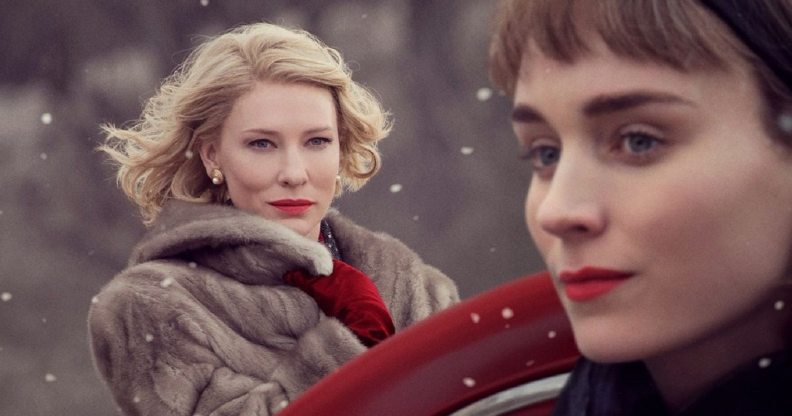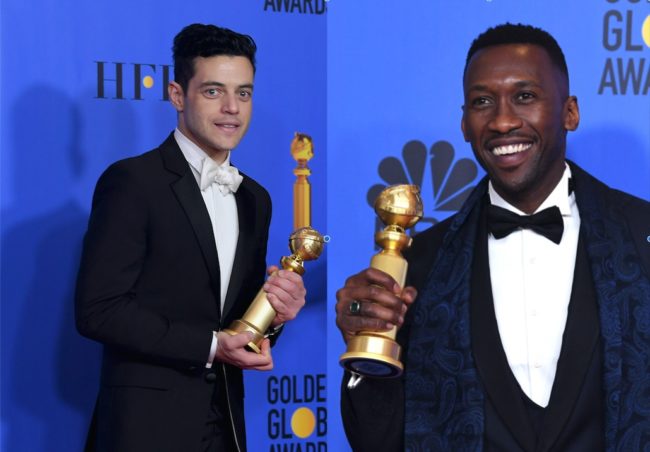When will Hollywood stop making excuses for queer erasure?

Cate Blanchett (L) and Rooney Mara (R) in Carol. (StudioCanal/The Weinstein Company)
In one of the most heartbreaking scenes from Carol, Cate Blanchett’s character points out that “there are no accidents” in life, and this is undoubtedly true of queer erasure in Hollywood too, no matter what excuses the studios might make.
After all, it’s no coincidence that Carol was deliberately snubbed by the Oscars back in 2016, despite being one of the best lesbian stories ever told on film.
In fact, Carol’s significant losses on the awards circuit are indicative of a far wider trend. Hollywood has come far since LGBTQ characters were openly demonised just a few short decades ago, but even this year’s Oscars ceremony included a more subtle and therefore insidious form of erasure.
Despite their numerous nominations, the authentic portrayals of queerness seen in The Favourite and Can You Ever Forgive Me? were sidelined yet again for the most part in favour of far more problematic characterisation in films like Green Book and Bohemian Rhapsody.
Instead of grounding Don Shirley’s story through his eyes – thereby supporting the real-life perspective experienced by a queer person of colour – Green Book pushed this character aside in favour of a ‘white saviour,’ making Don a ‘supporting actor’ in his own movie.
Bohemian Rhapsody achieved something similar by actively demonising Freddie Mercury’s sexuality. If the film is to be believed, then Queen’s frontman was successful despite his queerness and not because of it, something which is hard to reconcile with the flamboyant performer fans came to love on stage.
Even when Rami Malek finally acknowledged the queerness of the role during his Oscars acceptance speech for Best Actor, he did so by ignoring Freddie’s bisexuality completely.
Unfortunately, this is far from a new problem in Hollywood. As far back as 1946, a Cole Porter biopic called Night and Day avoided making any reference to the composer’s homosexuality and straight-washing has become prevalent ever since.
Authentic portrayals of queerness seen in The Favourite and Can You Ever Forgive Me? were sidelined yet again for the most part in favour of far more problematic characterisation in films like Green Book and Bohemian Rhapsody.
You’d think that things would be improving in #20biteen, but just last year, GLAAD discovered that the inclusion of queer characters in studio fare was actually the lowest it’s been since it began tracking inclusion in 2012, reflecting a downward trend in positive representation. As a result of this, the excuses these studios make about said erasure seem to be on the rise.

Bohemian Rhapsody and Green Book are controversial Golden Globe and Oscars winners. (Kevin Winter/Getty)
A history of queer erasure in Hollywood
Remember when J.A. Bayona edited out a character’s queer moment from Jurassic World: Fallen Kingdom just last year because of ‘timing issues’? Or how about when Marvel sidelined a lesbian romance in Black Panther because it was “too soon” and “the focus is somewhere else?”
Disney supposedly broke new ground for LGBTQ representation with their live-action remake of Beauty and the Beast in 2017, but that just boiled down to one small moment at the end which plenty would have missed if not for the publicity that surrounded it. It’s almost more insulting when studios pat themselves on the back for including just a frame or two of queerness in the name of ‘diversity.’
As bad as that might sound, at least LeFou and his male dancing partner actually appeared together on screen. It’s now become commonplace for studios to reveal a character’s sexual identity outside of the film via interviews and social media, thereby reducing the potential backlash from homophobic audiences while seemingly doing their bit for ‘inclusion’ still.
For example, Thor: Ragnarok star Tessa Thompson openly discussed her character’s bisexuality on Twitter, yet there was no evidence of this to be seen in the final cut, and Disney made Lando Calrissian pansexual in Solo: A Star Wars Story without ever exploring this in the film.
The exhaustive list of queer erasure in Hollywood doesn’t even stop there. In just the past few years alone, Fantastic Beasts, Ghostbusters and Star Trek: Beyond have all teased the LGBTQ community with positive representation of some kind, only to snatch it away in fear of the impact these characters might have on both domestic and international audiences.
It wasn’t so long ago when Sony UK promoted Call Me By Your Name with an image of Elio romantically involved with another woman, proving that even openly queer films are at risk of being misrepresented through erasure too. Unfortunately, the common sentiment from studios involved in most of these cases usually transpires to be an empty “sorry” without any desire to do better in the future.
Fantastic Beasts, Ghostbusters and Star Trek: Beyond have all teased the LGBTQ community with positive representation of some kind, only to snatch it away…
Whether it’s erasure on the awards circuit or erasure within the film itself, it’s clear that studios are making a conscious decision to sideline queerness in the pursuit of money. With the box office success of movies like Bohemian Rhapsody, this won’t come to an end anytime soon either.
As long as we allow Hollywood to keep making excuses, nothing’s going to change. It’s not until audiences actively protest queer erasure and celebrate the successes that occasionally do break through that we might finally have a shot at seeing ourselves represented in roles usually reserved for straight people.
As Carol said, “There are no accidents,” and it’s about time that we call Hollywood out for “accidentally” erasing our experiences on screen, time and time again.
David Opie is a journalist who has written for Into, Highsnobiety and NewNowNext.
The opinions reflected in this article are those of the author and do not necessarily reflect the views of PinkNews.

